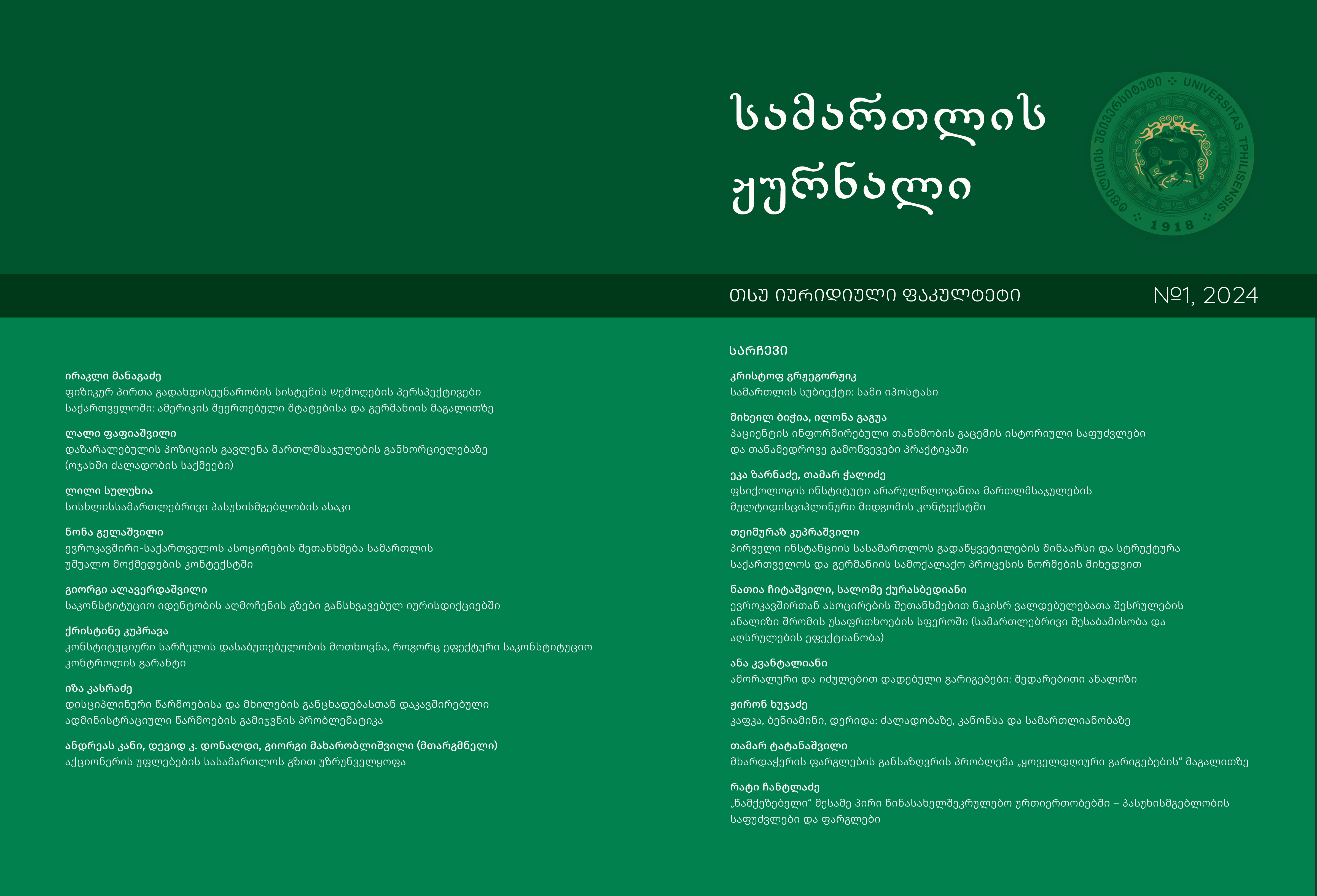პაციენტის ინფორმირებული თანხმობის გაცემის ისტორიული საფუძვლები და თანამედროვე გამოწვევები პრაქტიკაში
DOI:
https://doi.org/10.60131/jlaw.1.2024.7938საკვანძო სიტყვები:
პაციენტის პირადი ავტონომია, პატერნალიზმი, ისტორიული ექსკურსი, თანამედროვე მიდგომები, სასამართლო პრაქტიკა, მტკიცების ტვირთი, კომპენსაცია.ანოტაცია
პაციენტის ინფორმირებული თანხმობის დაცვის იდეა არაა თანამედროვე ეპოქის პირმშო. ის ჯერ კიდევ ანტიკურ ეპოქაში იყო ცნობილი, მაგრამ სხვა დატვირთვა ჰქონდა _ ინფორმირებული თანხმობის კონცეფცია ეფუძნებოდა პაციენტის სოციალურ სტატუსს. დიდი ხნის განმავლობაში მოქმედი პატერნალისტური დამოკიდებულება პაციენტის ნებას უგულებელყოფდა და ექიმს ანიჭებდა აბსოლუტურ თავისუფლებას, თვითონ გადაეწყვიტა პაციენტის მიმართ სამედიცინო ჩარევასთან დაკავშირებული საკითხები. ასეთ მიდგომას საფუძვლად ედო ის, რომ ყველაზე კარგად ექიმმა იცის, რა იქნება პაციენტისთვის კარგი.
მეოცე საუკუნის დასაწყისში უპირატესობა მიენიჭება პაციენტის პირადი ავტონომიის პრინციპს, რომელიც ნელ-ნელა ფეხს იმკვიდრებს სასამართლო პრაქტიკაშიც. თანამედროვე რეალობამ ყურადღება მიაქცია პაციენტის თავისუფალ ნებას, რითაც წინა პლანზე წამოსწია ადამიანის პირადი ავტონომიისა და ღირსების პატივისცემის იდეა. ამ მიზნით ჩამოყალიბდა პაციენტის ინფორმირებული თანხმობის გაცემის უმნიშვნელოვანესი პოსტულატები (ნებაყოფლობითობა, გაცნობიერების შესაძლებლობა, პაციენტის მიერ გადაწყვეტილების მიღების უფლებამოსილება და სხვ.), რომლებიც კუმულაციურად დაცვას მოითხოვს.
საყურადღებოა მტკიცების ტვირთის განაწილების საკითხი. კლინიკამ ბევრი უნდა იმუშავოს, რომ საკუთარი მტკიცების ტვირთში შემავალი გარემოებები დაძლიოს, რადგან ინფორმირებული თანხმობის დარღვევა არაქონებრივი ზიანის ანაზღაურების საფუძველიცაა. თუ მას ერთვის თან არაადამიანური ან დამამცირებელი მოპყრობა, ეს დარღვევის მაკვალიფიცირებელ ფაქტორად განიხილება ადამიანის უფლებათა ევროპულ სასამართლოში და არაქონებრივი ზიანის ანაზღაურების ოდენობას ზრდის.
უფლებების ეფექტიანი დაცვის სფეროში მნიშვნელოვანია ადამიანის უფლებათა ევროპული სასამართლო პრაქტიკის მიდგომების უფრო მეტად გათვალისწინება. ამ მიზნით ყურადღება უნდა მიექცეს არა მხოლოდ ინფორმირებული თანხმობის ფორმალურ ასპექტს, არამედ მისი შინაარსობრივი მხარის დაცვას.
წყაროები
European Convention of Human Rights, 4/11/1950 (In English).
Convention on Human Rights and Biomedicine, 04/04/1997 (In Georgian).
Civil Code of Georgia 26/06/1997, (In Georgian).
Bichia M., The Golden Rules of Giving Informed Consent According to the European Court of Human Rights Practice, in the collection of articles: "Protection of Human Rights: International and National Experience", ed. Korkelia K., Tb., 2022, 183-184, (In Georgian).
Bichia M., Features of Protecting the Patient's Personal Autonomy and of Giving Informed Consent (Georgian and European Approaches), "Law and World", 5 (12)(, 2019, 52-53, (In Georgian).
Bichia, M., Some Aspects on Compensating for Non-property Damages, Journal “Justice and Law", No. 3 (51), 2016, 107, (In Georgian).
Gabunia L., Khetsuriani Sh., Gamkrelidze N., Gumbaridze L., Varazi E., Medical Deontology and Prevention of Iatrogenic Diseases, Tbilisi State Medical University, Collection of Ccientific Works, N53, 2019, 29 (In Georgian).
Gagua, I., Burden of Proof in Non-pecuniary Damages, Journal “Justice and Law, N4 (72), 2021, 74 (In Georgian).
Ehman H., The Concept of General Right to Personality as a Fundamental Right and an Absolute Right, Georgian Translation, translated by Bichia M., TSU "Journal of Law", N2, 2013, 239. (In Georgian).
See, Chachibaia, T., Bioethical Aspects of Legal Norms of Medical Activity, Tb., 2005, 47-48, (In Georgian).
SCG, December 22, 2023, №ას-1444-2022, (In Georgian).
SCG, June 11, 2021 №ას-253-2021, (In Georgian).
SCG, March 16, 2021, №ას-1129-2020, (In Georgian).
SCG, July 26, 2019, №ას-645-2019, (In Georgian).
Ruling N2b/2951-18 of February 28, 2019, of the Civil Cases Chamber of the Tbilisi Court of Appeals (In Georgian).
Decision N213-14 of March 12, 2018, of the Civil Cases Chamber of the Tbilisi City Court (In Georgian).
Acosta Juana Vaccines I., Informed Consent, Effective Remedy and Integral Reparation: An International Human Rights Perspective, Universitas. Bogota (Colombia), No131: 19-64, julio-diciembre de 2015, 25-26.
Bazzano L. A., Durant J., Brantley P. R., A Modern History of Informed Consent and the Role of Key Information, Ochsner Journal, Vol. 21, Number 1, Spring 2021, 81-82.
Beauchamp T. L., Informed Consent: Its History, Meaning and Present Challenges, Cambridge Quarterly of Healthcare Ethics, 20 (04), 515-516.
Cruz P. De, Comparative Healthcare Law, London, Sydney, 2001, 326.
Dalla-Vorgia P., Lascaratos J., Skiadas P., Garanis-Papadatos T., Is consent in medicine a concept only of modern times? Journal of Medical Ethics, 2001, 27(1), 59, DOI: 10.1136/jme.27.1.59.
Del Carmen M. G., Joffe S., Informed consent for Medical Treatment and Research: A Review, The Oncologist, №10 (8), 2005, 637, 640.
Dove E.S., The EU General Data Protection Regulation: Implications for International Scientific Research in the Digital Era, in Journal of Law, Medicine & Ethics, 2018, 1021-1022.
Del Carmen M. G., Joffe S., Informed Consent for Medical Treatment and Research: A Review, The Oncologist, №10 (8), 2005, 637.
Del Carmen M. G., Joffe S., Informed consent for Medical Treatment and Research: A Review, The Oncologist, №10 (8), 2005, 637.
Dennis B. P., The origin and nature of informed consent: Experiences among vulnerable groups, Journal of Professional Nursing, 15(5), 1999, 281.
Dworkin G., Paternalism, in: Morality and the law (ed. Wasserstrom R.), Belmont California: Wadsworth, 1971, 107-108.
Dworkin G., Paternalism, The monist, 56 (1), 1972, 65.
Ehmann H., Der Begriff des Allgemeinen Persönlichkeitsrechts als Grundrecht und als absolute-subjektives Recht, in: Festschrift für Apostolos Georgiades, Athen; München, 2005, 128.
Gillon R., Medical ethics: Four principles plus attention to scope, Brit MedJ, Vol. 309, 1994, 184-185.
Gordon E., Multiculturalism in medical decision making: The notion of informed waiver, Fordham Urban Law Journal, Vol. 23, No 4, 1996, 1321, 1326-1327.
E. Hyslop, European Causation in Tort Law: a Comparative Study with emphasis on Medical Law in the United Kingdom, Germany and Frand and Luxembourg, A thesis submitted for a degree of PhD, Luxembourg, 2015, 169.
Kaba R., Sooriakumaran P., The evolution of the doctor-patient relationship, International Journal of Surgery, №5, 2007, 59, 64-65.
Komrad M. S., A defense of medical paternalism: maximizing patients' autonomy, Journal of Medical Ethics, 9(1), 1983, 38-39.
Kumar NK., Informed consent: Past and present, Perspectives in Clinical Research, 4(1), 2013, 21-22, 24, doi: 10.4103/2229-3485.106372.
Martini S., Die Formulierung der Menschenwürde bei Immanuel Kant in: Vortragsskript eines im WiSe 2005/06 gehaltenen Referats im Rahmen des rechtsphilosophischen Seminars "Die aktuelle Werte-Debatte" bei Prof. Klaus Adomeit (Freie Universität Berlin), 2005/06, 5-7.
Murgic L., Hebert C. P., Sovic S., Pavlekovic G., Paternalism and autonomy: views of patients and providers in a transitional (post-communist) country, BMC Medical Ethics, 16:65, 2015, 1-2.
Murray P. M., The History of Informed Consent, The Iowa Orthopaedic Journal, Vol. 10, 1990, 104, 109.
Pfordten Dietmar von der, Zur Würde des Menschen bei Kant, In Fünf Untersuchungen “Menschenwürde, Recht und Staat bei Kant”, 1. Auflage, Mentis, Paderborn, 2009, 19.
Rocio F.-B., Macarena S.-I., Ricardo O., Carmen H., Jose M. R. C., Alfonso C. J., Paternalism vs. Autonomy: Are They Alternative Types of Formal Care? Frontiers in psychology, Vol. 10, 2019, 1460-1461.
Rodriguez-Osorio C. A., Dominguez-Cherit G., Medical decision making: paternalism versus patient-centered (autonomous) care, Current opinion in critical care, Vol. 14, 2008, 709-710.
Sandman L., Munthe C., Shared Decision Making, Paternalism and Patient Choice, Health Care Analysis, 18(1), 2009, 61.
Schaber P., Menschenwürde und Selbstverfügung, Zurich, In: Byrd Sharon B.; Hruschka J.; C. Joerden Jan, Themenschwerpunkt: Recht und Ethik im Werk von Jean-Jacques Rousseau, Berlin, 2012, 319.
Schuman J., Beyond Nuremberg: A Critique of “Informed Consent” in third World Human Subject Research, Journal of Law and Health, Vol. 25, 2012, 124-125, 129-130.
Vollmann J., Winau, R., Informed consent in human experimentation before the Nuremberg code, British Medical Journal, Vol. 313, No. 7070, 1996, 1447.
Klimovich A. I., Evolution of doctor-patient communication models in modern medicine, Bulletin of Polotsk State University, Series E, Pedagogical Sciences, Philosophy, №15, 2019, 89. (in Russian). .
Krechetova M. V., Informed consent for medical intervention, To help the practicing nurse, № 4 (88), 2021, 11. (in Russian). .
G.M. and Others v. The REPUBLIC OF MOLDOVA, no. 44394/15, 22 February 2023.
Y.P. v. RUSSIA, no.43399/13, 20/12/2022, §.36.
N.B. v. Slovakia, no. 29518/10, 12 June 2012, §§ 79 -80.
V.C. v. Slovakia, no. 18968/07, 8 November 2011, §§ 116-19.
Glass v. The United Kingdom, 9 March 2004, no. 61827/00.
A.S. v. Hungary, CEDAW/C/36/D/4/2004, 29 August 2006.
Storck v. Germany, 16 June 2005, no. 61603/00.
Canterbury v. Spence, 464 F.2d 772 (D.C. Cir. 1972).
Salgo v. Leland Stanford, Jr. University Board of Trustees, District Court of Appeal, First District, October 22, 1957, No. 17045.
Schloendorff v. Society of New York Hospital, 105 N.E. 92, N.Y. 1914.
Mohr v. Williams – 95 Minn. 261, 104 N.W. at 13, 1905.
Pratt v Davis, 118 I ll App 161, 1905.
ჩამოტვირთვები
გამოქვეყნებული
როგორ უნდა ციტირება
გამოცემა
სექცია
ლიცენზია

ეს ნამუშევარი ლიცენზირებულია Creative Commons Attribution-ShareAlike 4.0 საერთაშორისო ლიცენზიით .









